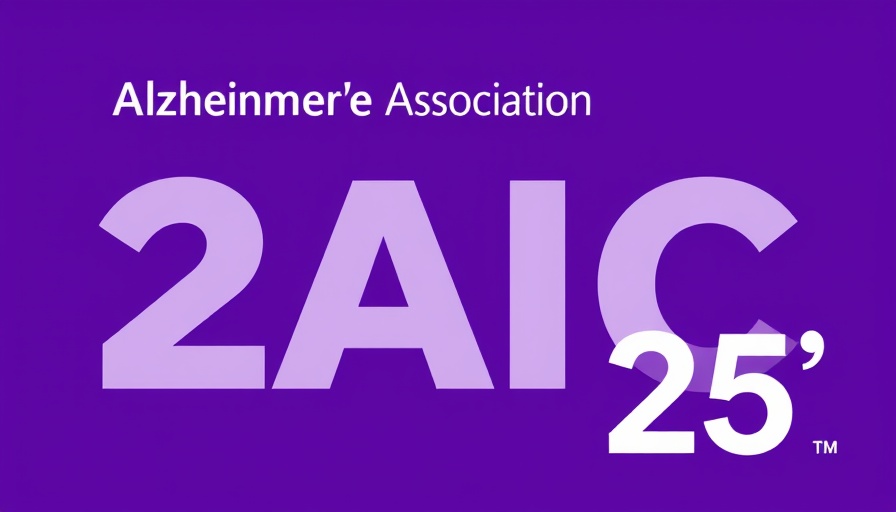
New Advances in Alzheimer’s Research Provide Hope
Recent findings unveiled at the Alzheimer’s Association International Conference® 2025 (AAIC®) shed light on potential paths to treating and delaying the symptoms of Alzheimer’s disease. This pivotal conference, held in Toronto and attended by nearly 19,000 participants, highlighted more than 6,400 scientific submissions focused on advancing our understanding of Alzheimer’s and other dementias. Susan Parriott, the Regional VP of the Alzheimer’s Association, emphasized, “AAIC is a cornerstone event for Alzheimer’s researchers—and for everyone committed to a future without Alzheimer’s and dementia.”
Inspiring Lifestyle Changes for Cognitive Health
Among the major breakthroughs presented were results from the POINTER clinical trial that revealed two lifestyle interventions capable of improving cognition among older adults at risk of cognitive decline. These interventions, which included increased physical activity, improved nutrition, and health monitoring, support the notion that adopting healthier behaviors can significantly bolster brain health. This leads to an exciting hypothesis: the integration of lifestyle programs with pharmaceutical treatments could represent the next frontier in cognitive health.
Blood Biomarker Guidelines: A New Diagnostic Approach
The Alzheimer’s Association also launched its first set of evidence-based clinical practice guidelines on utilizing blood biomarker tests. Aimed at various specialists, including neurologists and geriatricians, these guidelines are designed to help clinicians diagnose Alzheimer’s disease with greater confidence and consistency, reflecting a major step forward in diagnostic practices.
Pharmaceutical Interventions in Cognitive Decline
Data derived from five significant studies suggests that combining common medications for blood pressure, cholesterol, and diabetes might slow down cognitive decline. Participants who adhered to these combined medical regimens displayed cognitive test scores equivalent to those of individuals three years younger, a promising indication that managing these risk factors may play a critical role in dementia prevention.
Environmental Factors and Their Long-Term Effects
A groundbreaking study linking lead exposure in childhood to memory issues later in life grabbed attention. Following 600,000 participants, researchers acknowledged that over half of the U.S. population had been exposed to elevated lead levels. While this toxic substance has largely been eliminated from gasoline, other sources persist. Experts underline the importance for individuals with previous exposure to focus on mitigating other dementia risk factors, such as high blood pressure and avoiding social isolation.
The Double-Edged Sword of Genetics and Lifestyle
Further analysis of data concerning the Alzheimer’s risk gene, APOE4, suggests that individuals carrying this genetic marker stand to gain the most from lifestyle interventions. A decade-long study revealed that older adults with the APOE4 gene experience more pronounced cognitive benefits from non-pharmaceutical strategies like regular exercise, a nutritious diet, and cognitive training.
Community and Resources for Caregivers
For those affected by Alzheimer’s, the journey can be incredibly challenging. It’s essential for caregivers in Muskegon to access senior care solutions and community resources tailored to their needs such as communication support and emotional support groups. These resources not only provide practical advice but also foster community connections, which are invaluable for those navigating the complexities of Alzheimer’s care.
Your Next Steps in Alzheimer’s Care
The insights derived from the latest research are not just of academic interest; they offer tangible next steps for those affected by Alzheimer’s. It is critical for families and caregivers to engage with these findings. Start by reviewing your loved one’s lifestyle, consider consulting professionals about the new diagnostic guidelines, and explore medication management strategies that could contribute to better outcomes. As always, consult local experts in elderly support services Muskegon and utilize available programs to enhance the quality of life for both patients and caregivers.
For tailored guidance and support, consider reaching out for a more personalized plan. Call Terrijo Parker Today 231-571-6100 For Your Best Plan.
 Add Row
Add Row  Add
Add 




Write A Comment